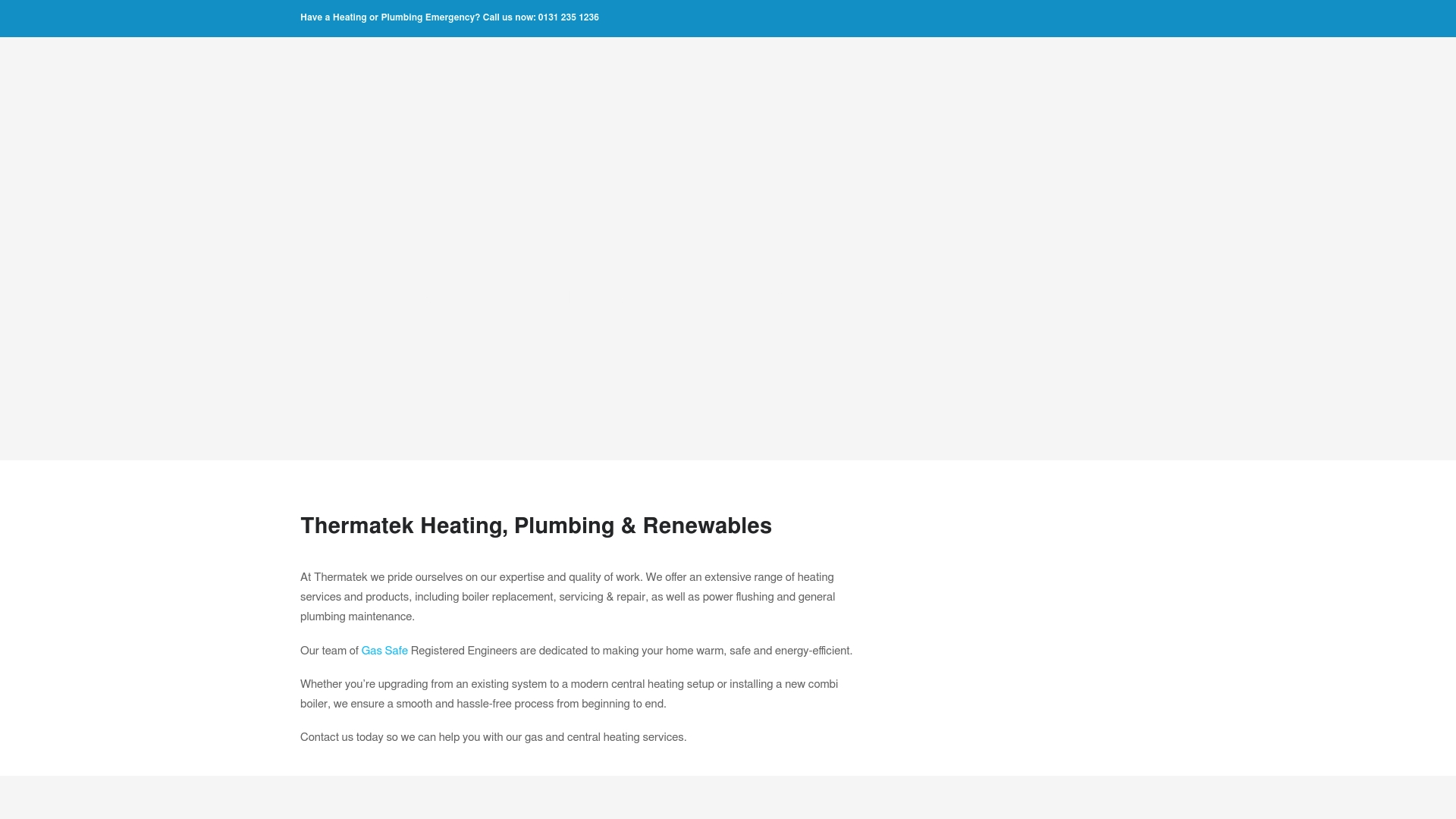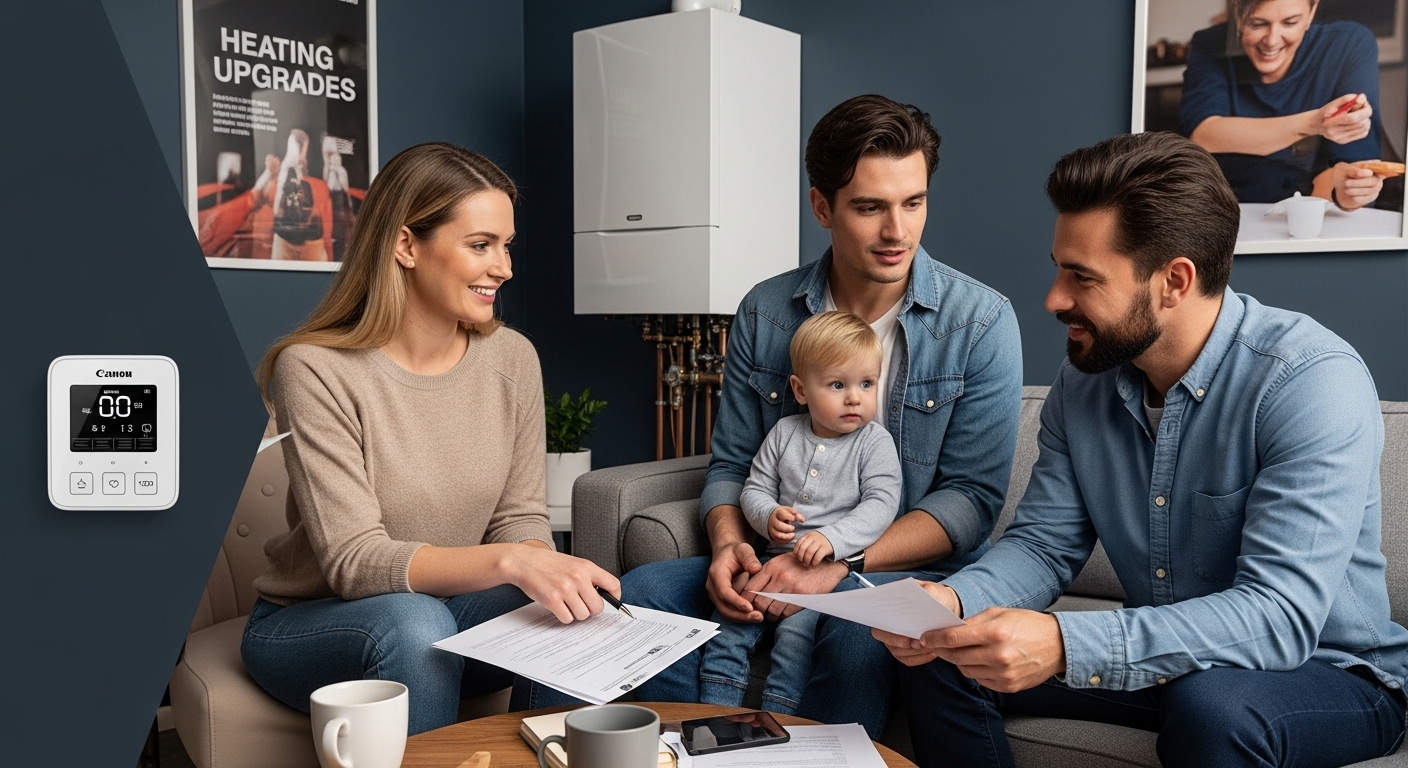Understanding Central Heating Upgrades for Homeowners
Central heating upgrades are transforming the way homes stay warm and comfortable across the country. Surprisingly, inefficient heating can account for up to 60 percent of a household’s total energy spend, draining budgets and wasting resources every year. Yet the real surprise is how a single upgrade can do far more than just lower bills—it can slash carbon emissions, enhance comfort, and even boost property value all at once.
Table of Contents
- What Are Central Heating Upgrades?
- Why Central Heating Upgrades Matter For Efficiency
- How Central Heating Systems Work: The Basics
- Key Innovations In Central Heating Technology
- Real-World Impacts Of Upgrading Heating Systems
Quick Summary
| Takeaway | Explanation |
|---|---|
| Upgrade your boiler for efficiency | Swapping an old boiler for a modern model can greatly reduce energy costs and improve heating performance. |
| Install smart thermostats | Intelligent controls can automatically adjust temperatures, optimizing energy use and enhancing comfort tailored to your schedule. |
| Improve insulation for energy savings | Enhancing your home’s insulation helps retain heat, leading to reduced energy consumption and lower bills. |
| Consider renewable energy options | Integrating technologies like heat pumps or solar heating can provide sustainable heating solutions and lower carbon emissions. |
| Evaluate system efficiency regularly | Regular assessments ensure your heating system adapts to needs, maximising comfort while minimising energy waste. |
What Are Central Heating Upgrades?
Central heating upgrades represent strategic improvements to a home’s heating infrastructure designed to enhance energy efficiency, reduce utility costs, and improve overall thermal comfort. These modifications range from simple component replacements to comprehensive system transformations that modernise how heat is generated, distributed, and controlled within residential spaces.
Understanding the Core Concept
At its fundamental level, a central heating upgrade involves enhancing or replacing elements of your home’s existing heating system. This could mean upgrading an outdated boiler, installing more efficient radiators, implementing smart thermostatic controls, or transitioning to renewable energy technologies. The primary objectives are to reduce energy consumption, lower carbon emissions, and create a more comfortable living environment.
According to government energy efficiency research, homeowners can significantly reduce their energy expenditure through strategic heating system improvements. These upgrades are not merely about replacing old equipment but represent a holistic approach to home energy management.
Types of Central Heating Upgrades
Homeowners have multiple pathways for central heating upgrades, each offering distinct benefits:
- Boiler Replacement: Swapping an old, inefficient boiler for a modern condensing model that captures waste heat
- Smart Thermostat Installation: Adding intelligent temperature control systems that learn household patterns
- Insulation Improvements: Enhancing wall, loft, and floor insulation to retain heat more effectively
- Renewable Technology Integration: Incorporating heat pumps or solar thermal systems for sustainable heating solutions
These upgrades not only improve immediate comfort but also contribute to long-term environmental sustainability and potential property value enhancement.
Below is a table summarising the main types of central heating upgrades discussed, along with their key benefits and primary focus areas.
| Upgrade Type | Key Benefit | Primary Focus |
|---|---|---|
| Boiler Replacement | Improves efficiency, lowers costs | Heat generation |
| Smart Thermostat Installation | Optimises energy use, enhances comfort | Temperature control |
| Insulation Improvements | Retains heat, reduces energy loss | Heat retention |
| Renewable Technology Integration | Provides sustainable heating, cuts carbon emissions | Energy source sustainability |
 The key is selecting upgrades tailored to your specific home configuration, energy consumption patterns, and budgetary constraints.
The key is selecting upgrades tailored to your specific home configuration, energy consumption patterns, and budgetary constraints.

Why Central Heating Upgrades Matter for Efficiency
Central heating efficiency is not just a technical concept but a critical factor in reducing energy consumption, minimising environmental impact, and managing household expenses. By understanding the intricate relationship between heating systems and overall energy performance, homeowners can make informed decisions that deliver substantial long-term benefits.
Economic and Environmental Impact
Modern central heating upgrades represent more than mere technological improvements. They are strategic investments that directly influence household economics and ecological sustainability. Inefficient heating systems can consume up to 60% of a home’s total energy budget, making them prime targets for performance optimization.
According to government energy efficiency research, strategic heating system improvements can generate significant savings and reduce carbon footprints. These upgrades transform heating from a passive utility into an actively managed resource.
Key Efficiency Considerations
Homeowners should evaluate central heating efficiency through multiple critical lenses:
- Energy Consumption: Measuring the total energy required to maintain comfortable indoor temperatures
- Heat Distribution: Assessing how effectively warmth is spread throughout living spaces
- System Responsiveness: Understanding how quickly heating systems adapt to changing temperature requirements
- Carbon Emissions: Calculating the environmental impact of heating technologies
The goal of central heating upgrades extends beyond immediate comfort. By implementing intelligent design and advanced technologies, homeowners can create heating systems that are responsive, economical, and environmentally conscious. Smart upgrades not only reduce monthly utility expenses but also contribute to broader sustainability objectives, making them a win-win solution for both household budgets and global environmental challenges.
How Central Heating Systems Work: The Basics
Central heating systems are sophisticated networks designed to distribute warmth consistently throughout residential spaces. These systems transform energy into heat through a carefully orchestrated process involving multiple interconnected components that work seamlessly to maintain comfortable indoor temperatures.
Core Components and Energy Transformation
At the heart of a central heating system lies the boiler, which serves as the primary heat generator. Modern boilers convert fuel such as gas, oil, or electricity into thermal energy, creating hot water or steam that circulates through a network of pipes and radiators. This process transforms potential energy into a practical, controllable heating solution for homes.
According to research from the City of York Council, the fundamental mechanism involves heating water in the boiler and then distributing it through radiators positioned strategically throughout the property. The temperature and distribution are carefully managed to ensure optimal comfort and energy efficiency.
System Control and Temperature Management
Effective central heating relies on sophisticated control mechanisms that enable precise temperature regulation:
- Room Thermostats: Monitor and maintain desired indoor temperatures
- Thermostatic Radiator Valves: Allow individual room temperature adjustments
- Programmers: Enable scheduled heating periods to match household routines
- Smart Controls: Provide remote temperature management and energy usage insights
These intelligent systems transform central heating from a simple warmth provider into a responsive, adaptive infrastructure that can learn and adjust to specific household requirements.
This table compares essential components and control features of central heating systems, providing a clear overview of their roles and contributions to home comfort and efficiency.
| Component/Control | Function | Contribution to Efficiency |
|---|---|---|
| Boiler | Generates heat from gas, oil, or electricity | Key to overall system performance |
| Radiators | Distribute heat throughout living spaces | Ensure even heat distribution |
| Room Thermostat | Monitors and manages desired indoor temperature | Prevents overheating and waste |
| Thermostatic Radiator Valves | Enable individual room temperature adjustments | Allows zoned heating and savings |
| Programmers | Schedule heating periods to fit routines | Reduces unnecessary operation |
| Smart Controls | Offer remote and adaptive system management | Maximises responsiveness and savings |
By understanding how these components interact, homeowners can optimize their heating systems for maximum comfort and minimal energy waste.
Key Innovations in Central Heating Technology
Central heating technology has undergone remarkable transformations, driven by the urgent need for energy efficiency, reduced carbon emissions, and enhanced user comfort. These innovations represent a significant leap forward in how we conceptualize, design, and implement residential heating solutions.
Smart Technology Integration
Intelligent heating systems have revolutionized temperature management, moving beyond traditional mechanical controls to create adaptive, responsive environments. Modern technologies enable homeowners to monitor, control, and optimize their heating remotely through smartphone applications and sophisticated network connections. These smart systems learn household patterns, automatically adjusting temperatures to minimize energy waste while maintaining optimal comfort levels.
According to government energy technology research, technological innovations are crucial in reducing residential energy consumption and supporting national decarbonization objectives.
Renewable Energy Convergence
The latest central heating technologies are increasingly integrating renewable energy sources, fundamentally changing how heat is generated and distributed. Key developments include:
Heat Pump Technology: Extracting thermal energy from air, ground, or water sources
Solar Thermal Systems: Using solar collectors to preheat water for heating
Hybrid Heating Solutions: Combining traditional boilers with renewable technologies for maximum efficiency
These innovations represent more than technological upgrades. They signify a profound shift towards sustainable, environmentally conscious heating strategies that balance performance, cost-effectiveness, and ecological responsibility. By embracing these cutting-edge technologies, homeowners can significantly reduce their carbon footprint while enjoying superior heating comfort.
Real-World Impacts of Upgrading Heating Systems
Heating system upgrades extend far beyond technical improvements, delivering tangible benefits that transform homeowners’ daily experiences and broader environmental landscapes. These upgrades represent strategic investments with multifaceted advantages that impact personal comfort, financial sustainability, and ecological responsibility.
Economic Transformation
Upgrading central heating systems delivers substantial economic advantages, dramatically reducing long-term energy expenditures. Homeowners can experience significant cost reductions through more efficient technology, with modern systems potentially decreasing energy consumption by up to 40%. The financial implications are profound, translating into hundreds of pounds saved annually on utility bills.
According to government energy efficiency research, strategic heating system improvements generate measurable economic benefits while supporting national energy efficiency objectives.
Environmental and Social Implications
Modern heating system upgrades contribute meaningfully to broader environmental goals, offering multiple interconnected advantages:
- Carbon Emission Reduction: Lowering household carbon footprints through advanced technologies
- Energy Conservation: Minimizing unnecessary energy consumption
- Resource Efficiency: Utilizing renewable and sustainable heating technologies
- Climate Change Mitigation: Supporting national decarbonization strategies
These upgrades represent more than individual choices. They constitute collective action towards creating more sustainable, environmentally responsible communities. By investing in advanced heating technologies, homeowners become active participants in addressing critical environmental challenges, demonstrating how personal infrastructure decisions can generate meaningful global impact.
Ready for a Warmer, More Efficient Home?
Are you tired of high energy bills and unpredictable heating? If the article “Understanding Central Heating Upgrades for Homeowners” made you aware of inefficient systems, wasted money, or outdated controls, now is the perfect time to take action. At Thermatek, we specialise in bringing advanced technology and personal expertise to every home across Edinburgh and Midlothian. You deserve the peace of mind that comes from a fully optimised, energy-efficient heating solution.

Imagine a home that stays consistently comfortable, with every pound spent on heating working harder for you. Our central heating upgrades include smart thermostats, boiler replacements, renewable solutions and professional maintenance tailored to your needs. Make the smart move today and contact our Gas Safe Registered engineers for your free quote or expert advice. Visit Thermatek Heating now and experience the transformation.
Frequently Asked Questions
What are the benefits of upgrading my central heating system?
Upgrading your central heating system can enhance energy efficiency, lower utility costs, improve thermal comfort, and reduce carbon emissions, leading to a more sustainable home environment.
How do I know if my boiler needs to be replaced?
Signs that your boiler may need replacement include frequent breakdowns, rising energy bills, inconsistent heating, and if your boiler is older than 10-15 years, as newer models are generally more efficient.
What types of upgrades can I make to my heating system?
You can consider various upgrades, such as replacing your old boiler with a modern condensing model, installing smart thermostats, improving insulation, or integrating renewable technologies like heat pumps or solar thermal systems.
How can smart thermostats improve my heating efficiency?
Smart thermostats learn household patterns, allowing for precise temperature control based on your schedule. This leads to reduced energy waste and more effective heating, ultimately saving you money on energy bills.

